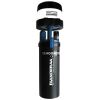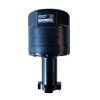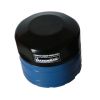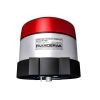Aanderaa RCM Blue Recording Current Meters
Features
- Bluetooth for communications and data retrieval
- Built-in solid state 3-axis tilt-compensated compass
- Battery compartments with up to 70Ah
- Expedited repair and warranty service
- Lifetime technical support
- More
Overview
The Aanderaa RCM Blue is a self-recording Current Meter which also measures water temperature as standard and pressure as optional. The Doppler Current Sensor is an upgraded version of the proven SeaGuard ZPulse sensor. The instrument configuration and data retrieval is done via Bluetooth, which eliminates the need to open the pressure case for repeated deployments. The DCS sensors are based on the backscatter acoustic Doppler principle.
Mechanics
The DCS measures in both directions on each axis and is insensitive to disturbance from vortex speeds around the sensor itself and the mooring line when the forward ping feature is enabled. The Aanderaa RCM Blue's multi-frequency technique reduces the required number of pings needed in order to achieve an acceptable statistical error. The achieved measurement precision is proportional to the inverse of the square root of the number of ping measurements in a measurement interval.
- RCM Blue Recording Current Meter
- 1 battery package, alkaline
- 1 empty battery shell (for e.g. lithium batteries)
- 2 magnetic tip pens to activate Bluetooth (one located inside the battery container)
- USB to Bluetooth adapter
- Configuration software, AADI Real-Time Collector
- Data visualization and analysis Software, Aanderaa Data Studio.
- Documentation CD including operating manuals and SW installation files
In The News
Floating Global New Ideas: Buoy-Enabled Research at Florida Agricultural and Mechanical University’s School of the Environment
Florida Agricultural and Mechanical University (FAMU), based in Tallahassee, Florida, is the highest-rated public Historically Black College or University in the United States. FAMU’s School of the Environment (FAMU-SOE) offers BS and BA degrees in Environmental Studies, and BS, MS, and Ph.D. degrees in Environmental Science, with specialisms available in areas including Environmental Policy and Risk Management, Aquatic and Terrestrial Ecology, and Biomolecular Sciences. In 2021, FAMU-SOE deployed a NexSens CB-450 buoy in Apalachee Bay, a key oyster farming area around 30 miles south of Tallahassee. The buoy has quickly been incorporated into the curriculum, providing environmental insights for student research, the community, and beyond. Dr.
Read MoreMonitoring Habitat Suitability and Water Quality in Northwest Arkansas Springs
Northwest Arkansas has seen an economic, industrial, and population boom in recent years as a result of expanding businesses, which have created thousands of jobs in the region and the mass migration of employees and construction companies. However, with this growth has come rapid urbanization and the degradation of the natural landscape, specifically the freshwater springs that can be found throughout the region. These springs are critical habitat centers for native wildlife, home to threatened and endangered fish, and those that have yet to be listed. Zach Moran, Assistant Professor of Fisheries Science at Arkansas Technical University, is working to help monitor these habitats and provide key data that will hopefully inform future development in the region.
Read MoreThree Decades of Research at Acton Lake
A multi-disciplinary team at Miami University, Ohio, has been studying the environmental change at Acton Lake for over three decades. Using three different NexSens buoys over this time, the team has an incredible archive of data that is helping build a picture of Acton’s past, present, and future. Until recently, a NexSens CB-50 buoy was used alongside other environmental monitoring at Acton Lake. In May 2025, the Miami team deployed a new XB-200 buoy , future-proofing their ongoing monitoring using real-time buoy systems. Acton Lake, a small hypereutrophic reservoir in southwest Ohio, covers 2.4km² and has a maximum depth of about 8m. The dam was built in 1956, and the lake has a large agricultural watershed.
Read More





















